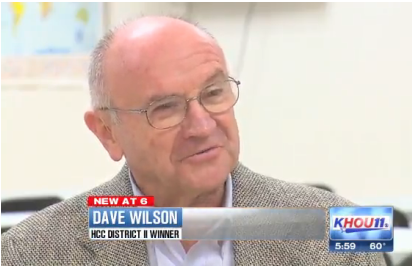The U.S. Supreme Court agreed to hear a case involving former Houston Community College trustee Dave Wilson who alleges in a lawsuit that the school violated his constitutional rights.
Wilson, who served on HCC’s board as a District II trustee for several years, filed a lawsuit in 2018 claiming the college violated his 1st and 14th Amendment rights after his fellow board members voted to censure him.
Board members said Wilson publicly criticized his colleagues’ votes and showed a lack of respect in the board’s decision-making process.
[…]
A U.S District Court judge dismissed the case in March 2019. Wilson later appealed in the 5th Circuit Court, which reversed the court’s original judgment in July 2020.
The Houston Community College System then filed a petition in December 2020 seeking the Supreme Court’s review of the district court’s decision, “arguing that a censure is a traditional form of government speech, an important tool of self-governance, and that the First Amendment does not protect an elected official from criticism,” HCC Chancellor Cesar Maldonado said in a written statement. The high court granted the petition Monday .
“It is our hope the Supreme Court will preserve the long-standing tool of censure because of its national importance to government institutions,” Maldonado said.
[…]
Shaundra Kellam Lewis, a law professor at Texas Southern University, said the Supreme Court decision to review the circuit court’s ruling when it only takes on about 100 cases a year is interesting but not surprising considering the conflict among circuit courts regarding the claim.
While the 5th Circuit ruled Wilson has a viable 1st Amendment claim, arguing that the board’s censorship went beyond disapproval of his conduct, a 10th Circuit ruling would state that the board’s censuring of Wilson was not a violation, Lewis said.
“We’re coming out of the Trump administration, when there was rancor and vitriol in political speech and what the conservatives called ‘cancel culture,’ where people are penalized for unfavorable speech,” Lewis said.
Josh Blackman, constitutional law professor at the South Texas College of Law Houston, said the free speech case is unique in that it involves people who were elected by the community. While government employees, like public service officials, are somewhat restricted by the government on what they can say, elected employees, like HCC board members, “have more free speech rights, which are not subject to review by colleagues, but by the electorate — the people,” Blackman added.
Both Lewis and Blackman predicted, however, that HCC will likely win the case.
Blackman said history shows that the Supreme Court typically reverses the decision of the lower court in the case of a petition. And Lewis said the Supreme Court will side with a majority of the other circuit court decisions that have addressed similar free speech cases.
See here for the previous update. I was a little surprised when I first read this, as I had not been aware that the Fifth Circuit reinstated the lawsuit. You know how I feel about Dave Wilson, so you know what outcome I’m rooting for.


I don’t always agree with Dave Wilson, but what he is fighting for is for the benefit of the community. Elected officials should not be silenced for speaking out.
Dave Wilson was censored because he spoke out against using HCCS taxpayers’ money to build a campus in Qatar.
He also spoke out for using HCCS money about building a campus in Katy. But, like Qatar, Katy does not pay HCCS taxes.
There should be more people like Dave Wilson that lookout after the taxpayer’s money.
DISCRETIONARY JUDICIAL REVIEW BY POLICY-MAKING APEX COURTS
Re: “the free speech case is unique”
Duh. — Every single case that gets accepted by the US Supreme Court is unique. Why would they otherwise select it to spend their valuable time on?
Josh Blackman is a very bright academic, and an extremely prolific scholar with a huge fan base as far as academic writing goes (30K+ total downloads of 71 papers on SSRN, to use just one stunning metric), but — like the justices whose work he expounds upon — he has ideological–or shall we say, jurisprudential–leanings of his own. So, his assessment as a legal expert is not the gospel.
The “gospel” much rather gets written and rewritten by a majority of nine breathing supreme beings. So, in the interim, it’s good to have a diverse set of legal scholars weigh in. A *mindset* diverse sample, that is. That includes the analytical framework (thinking like a discipline-bound scholar, here legal scholar/lawyer) and the underlying philosophical priors and assumptions.
Some of the controversies that bubble up to the top because there is “thought diversity” rather than societal consensus involve serious matters: like the most acceptable manner for a state to kill a captive in an execution chamber, and what punishment a public school may or may not inflict on an F-bombing teenager, to offer up just two timely examples.
DEAD-TEXT EXEGESIS
To think that legal experts are — or can be — totally neutral, or totally empirical for that matter, when they endeavor to predict how high courts will decide upcoming cases is an illusion.
When it comes to policymaking by judges on high courts (often disguised as the mere “finding” of meaning in words and concatenations thereof while channeling the spirits of framers and lesser law-writers), the normative is intertwined with the empirical, and the normative with the political. And it always happens in an ever-evolving social and political context.
RULE OF LAW IS RULE BY JUDGES
The constitution does not speak for itself. It doesn’t speak at all. Its authors are all dead. It takes breathing and blood-pumping supreme beings – conventionally appearing in black robes — to bring text to life and make it impactful to Wilson, or a bad”mouthed” adolescent cheer-squad reject, or you and me, not to mention all those entities that have so much power over us on an ongoing basis.